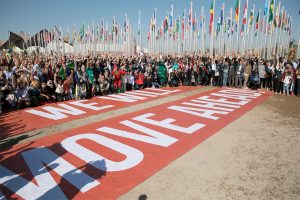The adoption of the Paris Agreement in 2015 marked a significant shift in the recognition of the role of so-called “non-Party stakeholders,” including civil society, local governments, academia, businesses, and others, in addressing climate change. In Paris, Parties to the UNFCCC put the spotlight on the climate actions taken by non-Party stakeholders, and established various processes to scale these up.
The launch of the Marrakech Partnership for Global Climate Action in late 2016 reaffirmed the recognition that climate action by a variety of stakeholders will be essential for meeting the Paris Agreement’s objectives and Sustainable Development Goal (SDG) 13 on taking urgent action to combat climate change and its impacts.
Non-Party stakeholders have a key part to play in the design and monitoring of national policies for implementing the Paris Agreement.
Yet much of the discussion around the role of non-Party stakeholders and the Paris Agreement has focused on encouraging these stakeholders’ own actions: cities and regions undertaking ambitious climate initiatives, businesses committing to greening their operations, civil society raising public awareness, etc. While such actions are undoubtedly important, they represent only part of the vital role of non-Party stakeholders in making Paris work. Non-Party stakeholders also have a key part to play in the design and monitoring of national policies for implementing the Paris Agreement. Participatory governance is in itself an objective of Agenda 2030, with Sustainable Development Goal 16 underlining the need to ‘[e]nsure responsive, inclusive, participatory and representative decision-making at all levels’ (SDG 16).
Recognition of this role has gained new currency – and urgency – with the ongoing negotiations on the so-called “Paris Rulebook.” Through the Rulebook, Parties will determine the operational rules for several key mechanisms, including the communication and accounting of Parties’ nationally determined contributions (NDCs), the development of domestic adaptation plans, the enhanced transparency framework under which Parties report and review progress, the five-yearly ‘global stocktakes’ to keep track of progress towards the Agreement’s long-term goals, and the mechanism to promote implementation and facilitate compliance. But this agenda for finalizing the Paris Rulebook overlooks the role of non-Party stakeholders in strengthening these same mechanisms. To give an example of this lack of recognition, a recent UNFCCC workshop on transparency closed to observers, and the summary report from the workshop does not contain any mention of the potential contribution of non-Party stakeholders to the transparency framework.
Yet we know that stakeholders can make a significant contribution to these mechanisms. For instance, civil society can act as watchdogs, monitoring implementation and compliance, and providing public scrutiny that can incentivize actions by Parties to meet, and go beyond, the level of ambition that they committed to. Stakeholders also can: provide relevant information and expertise on where we are in terms of emission reductions; identify new options for deeper and faster climate action; help overcome key barriers to implementation, such as gaps in capacity, funding or technical knowledge; and drive up ambition of Parties by leading the way. All Parties to the Paris Agreement have already recognized the importance of these multiple roles in the context of other international instruments.
Stakeholders thus have a key contribution to make in putting the Paris Agreement into practice. For instance, for the NDCs to be truly “nationally determined” and ensure for their implementation to benefit from broad public support, Parties should include domestic stakeholders in the development of NDCs and adaptation plans. Furthermore, civil society and research organizations could be invited to complement governmental reports on progress made in NDC implementation, to inform the review process under the transparency framework. Likewise, stakeholders can be explicitly invited to intervene and contribute in the run-up and during the periodic assessments of collective ambition – including the global stocktakes and, more immediately, the 2018 Facilitative Dialogue. Finally, observer organizations could be assigned roles in relation to the implementation and compliance mechanism to help this mechanism achieve its purpose.
In these ways, stakeholders can strengthen public ownership and support for climate policies, offer independent and complementary insights and expertise into the progress made by Parties in implementing and enhancing the ambition of the Paris Agreement, help ensure that the outcomes of review processes are taken up within countries, and, if necessary, help hold Parties to account.
As an intergovernmental process, decisions under the Paris Agreement are ultimately taken by sovereign states. But leaving the contributions of non-Party stakeholders out of the design and implementation of the Paris Rulebook would be a missed opportunity for Parties and non-Party stakeholders alike – both as a matter of effective climate action (SDG 13) and of good governance (SDG 16).

